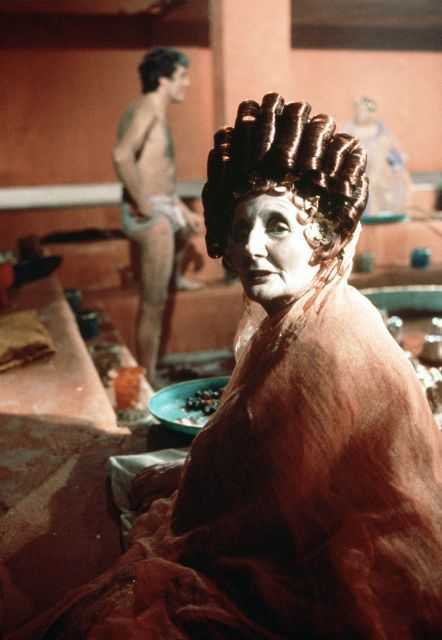Satyricon | |  |
Production: P.E.A. Italy, 1969
Director: Federico Fellini
Producer: Alberto Grimaldi
Scenario: Federico Fellini, Brunello Rondi, Bernardino Zapponi
Story: Petronius
Director of Photography: Giuseppe Rotunno
Composer: Nino Rota
Editor: Ruggero Mastroianni
Costume Design: Danilo Donati
Cast: Hylette Adolphe [La Schiavetta], Max Born [Gitone], Lucia Bosé [La matrona], Capucine [Tryphaena], Alain Cuny [Lichas], Fanfulla [Vernacchio], Hiram Keller [Ascyltus], Dancia La Loggia [Scintilla], Tanya Lopert [Kaiser], Donuale Luna [Oenothea], Gordon Mitchell [Brigant], Magali Noël [Fortunata], Martin Potter [Encolpius], Salvo Randone [Eumolpus], Mario Romagnoli [Trimalchio], Mario Romagnoli [Il suicida], Leopoldo Valentini [Trifena's Old Handmaid]
Technical Details: Color,Length: 123 minutes
Sound System: not indicated
German title: Fellini's Satyricon
English title: The Degenerates
Synopsis in German
Die jungen Römer Encolpius (Martin Potter) und Ascyltus (Hiram Keller) sind Rivalen um die Gunst des Lustknaben Gitone (Max Born). Encolpius entführt ihn dem Schauspieler Vernacchio (Fanfulla), verliert ihn aber schnell wieder an Ascyltus. Der Dichter Eumolpus (Salvo Randone) nimmt Encolpius mit zum Gastmahl des Trimalchio (Mario Romagnoli), der seinen Reichtum protzig zur Schau stellt. Auf einem Piratenschiff finden Encolpius, Ascyltus und Gitone später wieder zusammen und werden in immer neue bizarre Abenteuer verstrickt. Encolpius muss wie Theseus gegen den Minotaurus kämpfen, aber der entpuppt sich als Schauspieler; als der blonde Jüngling seine Männlichkeit verliert, tun sich selbst sehr liebeskundige schöne Mädchen schwer mit ihm. Schließlich stirbt Ascyltus, und Encolpius macht sich auf die Suche nach einer neuen Welt. (ARD Presse)
Remarks and general Information in German: "In "Satyricon" hat Fellini, der 1993 gestorbene italienische Regisseur, Anleihen bei den Roman-Fragmenten des Petronius und antiken Mythen zu einer fantastischen Odyssee durch das Rom Neros und in die Abgründe der Seele verschmolzen. Wie Traumbilder reihen sich Szenen opulent-ausschweifender Lustbarkeiten und blutiger Gewalt aneinander; hinter antiker Maskierung grinst oft die Fratze der Gegenwart. Fellinis Lust an schönen und hässlichen, boshaften und verkommenen Gesichtern, an Körpern und an manieristischem Dekor feiert hier besonders fantastische Triumphe. An vielen verschiedenen Interpretationen des Films hat es nicht gefehlt; manche Kritiker sahen in ihm vor allem ein Loblied auf heidnische Sinnenfreude, andere eine apokalyptische Karikatur unserer Zeit im Gewande einer "altrömischen Walpurgisnacht". (ARD Presse)
Weitere Filme mit diesem Titel
1969: Satyricon, Regie: Gian Luigi Polidoro,
References in Databases
KinoTV Database Nr. 33628
Last Update of this record 0.00.1012Disclaimer
The information above does not purport to be exhaustive, but give the level of information to our database at the time of last update. All figures are best knowledge and belief researched to, legal claims arising from incorrect or missing information are expressly rejected.
Due to the current law in some countries can be held responsible person who addresses refers to having a criminal content spread may or criminal content and pages further refer, unless he closes clear from such liability. Our links below are researched to the best of my knowledge and belief, but we can not accept in any way for the content of these web pages and links from us any liability. We provide this explanation by analogy from all countries and all languages of. Quotations, if not otherwise marked, in the usual right to quote with identification of the sources added.
The copyright lies with the authors of these quotes - Satyricon - KinoTV © June 19, 2024 by Unicorn Media
Satyricon - KinoTV © June 19, 2024 by Unicorn Media


